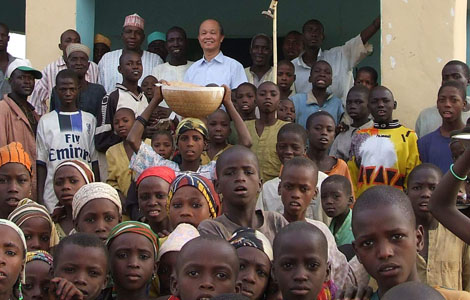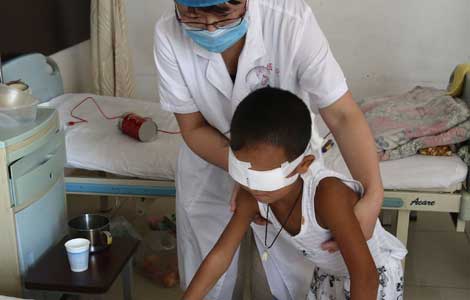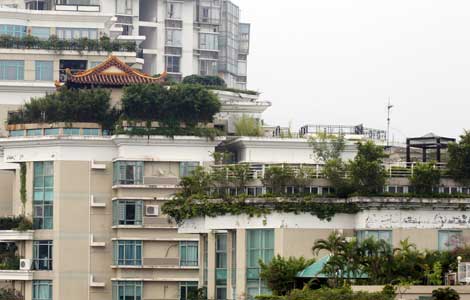China to subsidize PV power units
Updated: 2013-08-31 08:14
By Zheng Yangpeng (China Daily)
|
||||||||
China announced policies on Friday to ramp up support for renewable energy projects, in a bid to curb air pollution.
The National Development and Reform Commission issued new subsidy standards for distributed solar power generation projects, stipulating a 0.42 yuan (7 cents) subsidy for every kilowatt-hour of electricity produced by distributed photovoltaic, or PV, power units.
The policy is the country's first of its kind.
Distributed PV power units were previously subsidized on a project-investment basis. The new standards will cover units that were not included in the previous policy.
The government will also lower the price of the power generated by some PV stations. In some solar-rich western regions, the price will be lowered to 0.9 yuan or 0.95 yuan per kWh, from the previous national standard of 1 yuan per kWh.
The policy will be applied to projects registered after Sept 1, or registered before that date but that will be put in use after the beginning of next year. The subsidy commitment will last at least 20 years, the NDRC said.
The price of the power generated by PV stations in eastern regions will be kept at 1 yuan per kWh.
"These policies will be a boost to China's PV industry. We hope that companies will be encouraged to scale up their products' standards," said Li Caihua, an official with the NDRC.
China's PV industry has long been strained by the anti-dumping policies of the European Union, which is a major market for solar panel manufacturers.
The government also boosted support for power plants that install equipment to limit air pollutants. Coal-based power plants are a major contributor to China's air pollution.
Power plants that install equipment to remove nitrogen oxide - a major air pollutant - will receive a subsidy of 0.01 yuan per kWh of electricity they produce starting from Sept 25, up from 0.008 yuan previously. And plants that produce power under a certain particle-emission standard will also receive a subsidy of 0.002 yuan per kWh.
This policy, along with the previous 0.015 yuan per kWh subsidy for power plants that installed equipment to curb sulfur dioxide emissions, will require an annual State investment of more than 80 billion yuan.
"In general we aim to provide both incentives for power plants to reduce emissions of air pollutants, and severe punishment for those who fail to do so," said Li.
Plants that have the equipments to curb pollution but fail to operate them will be punished.
Past incentives by the NDRC have been effective, according to analysts.
The government implemented subsidies for plants with equipment to curb sulfur dioxide emissions, and gradually raised the subsidy standard to 0.015 yuan per kWh. Now, 92 percent of Chinese power producers have installed the equipment, up from around 10 percent before the policy was implemented.
"People in the environment-protection sector have long awaited these policies. The measures will leverage behavior to curb air pollutants and boost the related-equipment industry," said Liu Bingjiang, an official at the Ministry of Environmental Protection.
Chinese authorities previously pledged to reduce emissions of sulfur dioxide and nitrogen oxide by 16 percent and 29 percent respectively from their 2010 basis through 2015.
The NDRC also decided to beef up government-managed funds for the renewable energy subsidies by collecting more money from power producers.
Starting from Sept 25, China's power plants will have to pay 0.015 yuan per kWh for the electricity they produce for industrial clients, up from 0.008 yuan per kWh.
The prices of electricity for residential and agricultural use will remain the same.
The NDRC emphasized that the increase will not lead to an increase in electricity retail prices. Power producers' costs will not increase significantly because coal prices are at historic low levels, the commission said.
The NDRC also decided to raise gasoline and diesel prices by 0.17 yuan and 0.19 yuan per liter respectively. The price hikes will be implemented on Saturday.
Most Viewed
Editor's Picks

|

|

|

|

|

|
Today's Top News
Rousseff consults cabinet on US spy claims
Banks rake in profits
Automakers look to drive sales overseas
Trading error dims Everbright's prospects
Li sees opportunities despite dispute
Assad slams Western accusation
Xi's planned visit to Turkmenistan lauded
Beijing to consider fees for car congestion
US Weekly

|

|















